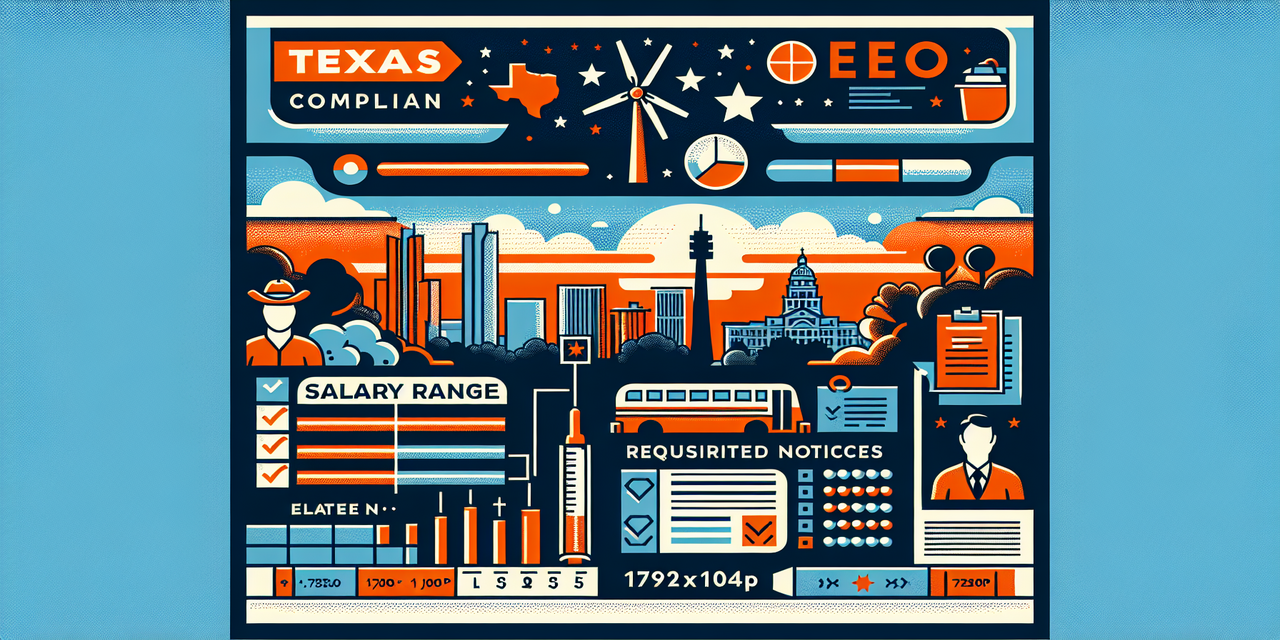Texas Compliant Job Posting Template: Key Takeaways
- Texas private employers are not required by state law to disclose salary ranges in job postings.
- EEO statements are not mandatory for Texas private employers but are legally required for federal contractors and considered best practice.
- Job postings must avoid discriminatory language and use gender-neutral, inclusive terms to comply with federal anti-discrimination laws.
Creating compliant job postings in Texas involves understanding state laws and federal requirements. Employers can promote fairness by adopting best practices in salary transparency, EEO statements, and inclusive language.
This guide outlines the essentials for Texas employers to draft legally sound job postings while fostering an equitable hiring process.
1. Salary Ranges in Texas Job Postings
Unlike some states, Texas does not mandate private employers to include salary ranges in job advertisements. No Texas-specific pay transparency laws require such disclosures.
For a broader view of national policies, review salary range laws that may apply in other states.
However, federal regulations like Title VII of the Civil Rights Act and the National Labor Relations Act (NLRA) still apply, regulating compensation practices to prevent discrimination based on protected characteristics.
Although not required, some employers voluntarily include salary ranges to improve transparency, attract qualified candidates, and demonstrate fairness in compensation.
2. Required Notices and EEO Statements in Texas Job Postings
Private employers in Texas are not legally obligated to add Equal Employment Opportunity (EEO) statements in job postings unless they are federal contractors. For federal contractors, including an EEO statement is mandatory.
Incorporating an EEO statement, even voluntarily, signals the employer’s commitment to equal opportunity and can help attract a diverse applicant pool.
Examples of commonly used EEO statements include phrases like "We are an equal opportunity employer" or "All qualified applicants will receive consideration without regard to race, color, religion, sex, national origin, disability, or veteran status."
When hiring leadership roles, use a clear, inclusive restaurant manager job description to align expectations.
Why Include EEO Statements Even When Not Required?
Adding EEO statements enhances the employer’s reputation for fairness, encourages applications from underrepresented groups, and reduces risk of discrimination claims by clarifying commitment upfront.
It is considered an important best practice aligned with federal equal employment opportunity laws, although Texas does not specifically mandate such postings.
3. Avoiding Discriminatory Language in Texas Job Postings
Employers must be cautious to avoid language that suggests bias based on protected characteristics such as gender, race, religion, age, or disability.
Job advertisements should focus strictly on the essential qualifications, experience, and responsibilities related to the position.
Using gender-neutral job titles (e.g., "sales associate" instead of "salesman") and neutral pronouns prevents unintended exclusion.
Examples of Inclusive Job Posting Language
- “Candidates must have proficient communication skills.”
- “Ability to perform essential job functions.”
- “We encourage applications from all qualified candidates.”
Employers should avoid words or phrases that express preference for a specific gender, age range, or other protected class unless legally justified by a bona fide occupational qualification.
Use this guide to avoid discrimination in job postings across hospitality roles.
4. Required Workplace Postings Related to EEO in Texas
While not part of job postings, employers operating in Texas must display the “EEO is the Law” poster prepared by the Equal Employment Opportunity Commission (EEOC) in a conspicuous workplace location.
This poster summarizes federal anti-discrimination laws and notifies employees of their rights and the employer’s obligations.
Employers can obtain these posters directly from the EEOC website or order printed copies to comply with posting requirements.
Front-of-house hiring can also benefit from a structured server job description that outlines duties and requirements.
5. Best Practices for a Texas Compliant Job Posting Template
To create compliant and effective job postings under Texas and federal law, employers should:
- Consider including salary ranges voluntarily to enhance transparency and candidate trust.
- Incorporate an EEO statement to demonstrate commitment to fair hiring, especially for federal contractors.
- Use clear, inclusive, gender-neutral language focusing on qualifications and responsibilities.
- Avoid any language or criteria that could be interpreted as discriminatory or exclusive.
- Ensure awareness and display of required federal workplace posters like “EEO is the Law.”
If you choose to share pay, these salary disclosure tips can help you phrase ranges consistently and legally.
Hotels should reference a detailed housekeeper job description to define essential functions and physical requirements accurately.
6. Additional Resources for Texas Employers About Job Posting Compliance
Employers seeking further guidance on compliant job posting practices and equal employment opportunity regulations may consult the following official resources:
Texas Compliant Job Posting Template: Conclusion
In Texas, private employers are not required to disclose salary ranges or include EEO statements in job postings, but federal laws governing discrimination still apply.
Employers benefit from voluntarily adopting salary transparency and EEO commitments to foster fairness and attract a diverse workforce.
By using inclusive language and meeting federal posting requirements, Texas employers can maintain compliance and promote equitable hiring practices.
For beverage roles, start with a concise bartender job description to stay clear and inclusive.

.png)

.png)
.jpg)